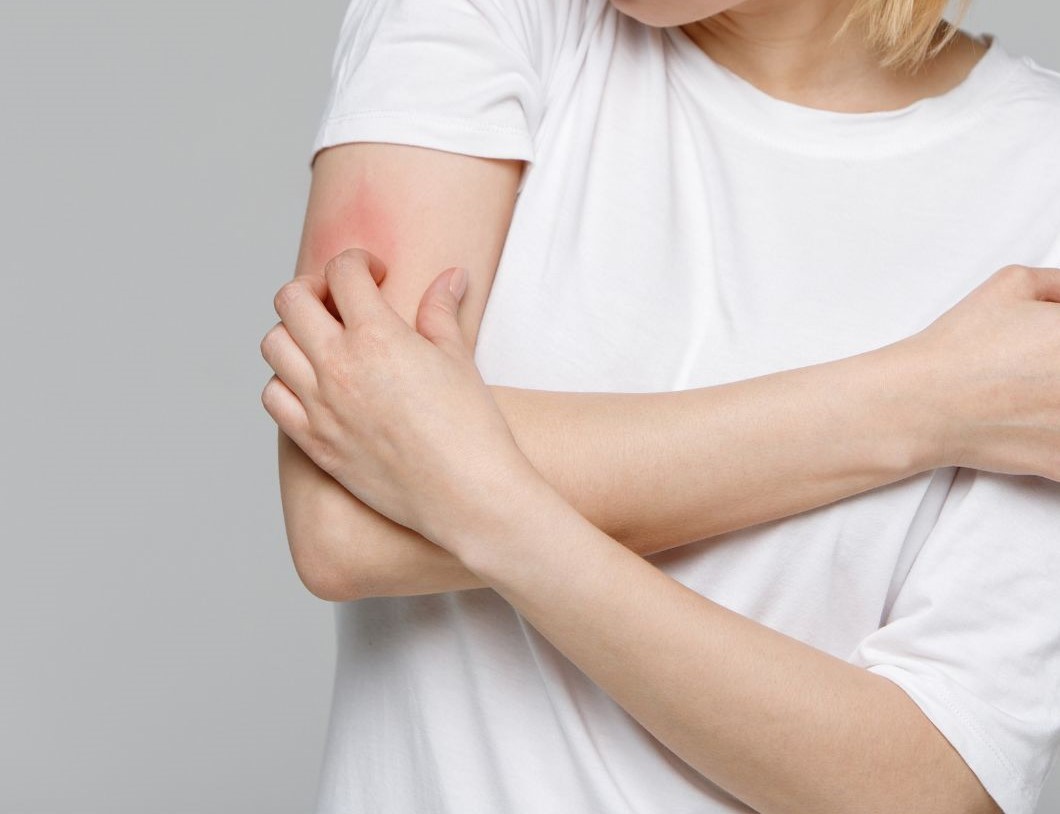Eczema is a prevalent skin condition characterized by a non-infectious rash. The rash typically causes redness, itching, and scaling and can manifest in different areas depending on the patient's age and the type of eczema.
There are many sub-categories of Eczema that fall under 3 main types:
The most common type of eczema is atopic eczema, also known as atopic dermatitis, which typically appears during childhood.
Atopic eczema is often linked with a family history of other allergic conditions such as hay fever and asthma, which together make up the “atopic triad”. Children are more likely to develop atopic eczema if one or both parents have eczema, hayfever or asthma. Food allergies are also often involved. as well as allergies to grasses, pollens, moulds and animal dander.
Some children outgrow skin symptoms, however approximately three quarters will go on to develop hay fever or asthma. In most cases, there are periods of exacerbations or flares, followed by periods of remission.
In contrast, non-atopic eczema, also known as intrinsic eczema, accounts for approximately 20% of eczema cases and is not associated with allergic triggers like atopic eczema. The presentation and treatment of non-atopic eczema differ from those of atopic eczema.
Are eczema and dermatitis different?
Dermatitis is a general term for skin inflammation that is often used interchangeably with eczema, although they can vary in terms of symptoms, causes, and triggers.

With Atopic eczema there is a genetic pre-disposition to this form.
Research indicates that a significant number of people with eczema may have a genetic mutation in the filaggrin gene, which plays a crucial role in maintaining a healthy and robust skin barrier. This mutation can result in water loss through the skin, leading to dryness and reduced protection against external environmental factors and microbes. Furthermore, individuals with eczema tend to have hypersensitive, immune systems that can react to various dietary and environmental substances, exacerbating the condition. The immune system can become misguided and create inflammation in the skin, even in the absence of a major infection. This can be viewed as a type of auto-immunity, where by the body is reacting against itself.
With other forms of eczema such as dermatitis triggers can be exposure to various agents such as wool, nickel, certain chemicals like detergents and disinfectants, cosmetic and sunscreen ingredients, certain foods, as well as bacterial, viral, and fungal infections and yeast growths. Environmental factors such as extreme temperatures, humidity, dry weather, stress, and perspiration can also contribute to dermatitis.

Furthermore, stress can trigger the release of certain hormones, such as cortisol, which overtime can affect the body's inflammatory response and increase the severity of eczema symptoms.
Injury - Injury can be a trigger for eczema, particularly in individuals who already have a history of eczema or other allergic conditions. When the skin is injured, it can disrupt the skin barrier and cause inflammation, making the skin more susceptible to eczema flare-ups.
For example, injuries such as cuts, burns, insect bites, or surgical wounds can cause a localized inflammatory response in the skin, which can trigger eczema symptoms in the affected area. In addition, repetitive actions, such as scratching or rubbing the skin, can also cause injury to the skin and trigger eczema symptoms.
Common dietary triggers for eczema include dairy products, eggs, nuts, soy, wheat, fish and seafood. These foods contain proteins that can cause an allergic reaction in some individuals, leading to eczema symptoms. In addition, certain food additives, such as preservatives, may also trigger eczema in some individuals.
Food chemicals found in healthy foods, such as salicylates and histamines can also exacerbate eczema in some people.

Eczema, also known as atopic dermatitis, can appear on various parts of the body, including:
Constant scratching often causes patches of skin to become thickened over time. This is typical of chronic eczema. In acute eczema blistered and weepy skin with redness and swelling is common.
Topical steroids
Topical calcineurin inhibitors such as tacrolimus
Light therapy
Antiseptics such as Bleach baths
Emollients and moisturisers
Oral corticosteroids, biologics or immunosuppressant’s in more severe cases
To promote healthy skin, we employ natural, steroid free topical treatments that contain herbal and biologically active ingredients that are based on over 30 year’s research.
Our treatment approach is tailored to the type of eczema, the presentation, the location on the body, the skin sensitivity and many more factors.
While addressing the skin topically, it is also important to dig deeper into the underlying triggers, of which there can be many. This is why a thorough consultation is important to identify and treat your individual triggers.
To address the triggers, natural oral medicine, nutrition (including addressing nutritional deficiencies, allergies and intolerances), topical treatment and lifestyle medicine are utilised. Pathology reviews are also often undertaken.
On occasion, functional tests such as the complete microbiome map may be recommended on a case by case basis.
If you would like help with your eczema, make an appointment with the clinic today.
©2025 Sage & Well Site by RAZOR Web Design